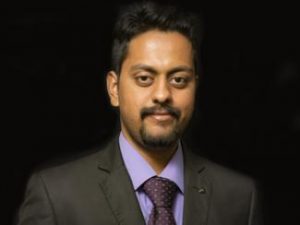The talk was conducted on 27 November 2020.

Bio: Dr Vikram Shenoy Handiru is currently an Associate Research Scientist at Kessler Foundation in New Jersey, USA. Before beginning this postdoctoral journey, he was a PhD researcher (2013-2017) at Interdisciplinary Graduate School, Nanyang Technological University, (Singapore) working on EEG-based Brain-Computer Interfaces. Dr Handiru did his Bachelor of Technology in Electronics & Communication Engineering from National Institute of Technology Karnataka, Surathkal (India) during 2009-2013. His overarching research goals are (1) to develop signal processing and machine learning algorithms to understand the brain dynamics (2) to advance the understanding of the neurophysiology of neuromuscular disorders and (3) to develop personalized therapeutic approaches for neurorehabilitation.
Abstract: Stroke is a leading cause of long-term severe impairment that affects mobility in more than half of survivors of stroke of age > 65 years. The long-term goal of rehabilitation is to improve motor functions so that the stroke survivor can become as independent as possible. In this talk, Dr Handiru will present the prospects of the neuroengineering technologies for stroke and Traumatic Brain Injury rehabilitation. Dr Handiru will begin his research talk by introducing the concept of electroencephalography (EEG)-based Brain-Computer Interface (BCI), which is the technology that allows direct communication between the brain and an external device such as a computer. Signal processing and pattern recognition constitute essential components of a BCI system wherein the signal processing algorithms are applied to the brain signals to decode mental states which are relevant for BCI operation. In this talk, the basic BCI concepts such as brain activity monitoring using EEG, feature extraction, and feature translation for BCI control are introduced. In the latter half, the research will focus on the applications of neurorehabilitative technologies such as BCI and noninvasive brain stimulation (NIBS), and stabilometry training to improve the upper- and lower-extremity motor functions in the stroke and TBI population. The talk will conclude by providing some future research directions.

